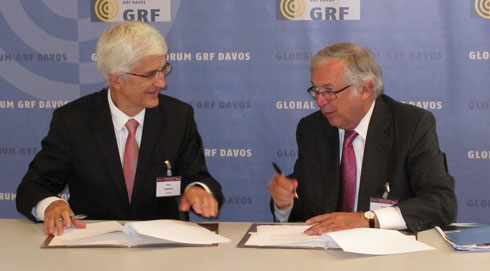Virginia Tech creates Global Forum on Urban and Regional Resilience

Virginia Tech has announced a presidential initiative, the Global Forum on Urban and Regional Resilience, to bridge public policy and practice in the broad domain of community resiliency.
“We live in an interconnected and complicated world. This initiative aims to foster interaction among varied disciplines that contribute to global understanding of resilient communities,” said Virginia Tech President Charles W. Steger.
In concert with the most recent university strategic plan that calls for expansion of work in the realm of interdisciplinary and translational research, the new group will serve as an information nexus for organizations around the globe looking at disaster response and recovery, critical infrastructure, and urbanization.
The forum will be co-directed by two seasoned researchers, Paul Knox and James Bohland, who both have expertise in urbanization, complex systems, and resiliency. Knox is currently University Distinguished Professor and Senor Fellow for International Advancement and Bohland, who retired last year as vice president for Virginia Tech’s National Capital Region operation, is currently in that role again on interim basis.
In announcing the creation of the global forum Aug. 29 at the Fourth Conference on Community Resiliency in Davos, Switzerland, an event co-hosted by Virginia Tech, the U.S. Academy of Science, and the Global Risk Forum, Steger said, “Its mission is to contribute to new and dynamic ecologies of resilience by connecting nodes of excellence globally. We seek to advance the principles of a new, resilient ecology of cities and regions in three ways: the generation, translation, and dissemination of new knowledge. We will create a network of partners, collaborators, and research colleagues worldwide focused on resiliency.”
"There is a need to ground resilience in real-world decision-making" said Knox. "We want to support the development of living labs in multiple locations, and to connect university researchers with international, national, and regional agencies and organizations, public and private, with interests and expertise in various aspects of resilience."
Workshops on specific themes and practices will be held at Virginia Tech sites in the United States, Europe, and Asia.
“In addition to generating our own research and scholarship, we plan to be an international clearing house,” said Bohland. “We will bring together the world’s experts. We will investigate innovative ways to disseminate knowledge to build a culture supportive of resiliency across jurisdictions. The forum will become the campus home for our faculty working in all facets of resiliency and the linkage with our partners around the globe.”
“Virginia Tech has the expertise, experience, and reputation to lead a global effort like this,” said Steger.
Dedicated to its motto, Ut Prosim (That I May Serve), Virginia Tech takes a hands-on, engaging approach to education, preparing scholars to be leaders in their fields and communities. As the commonwealth’s most comprehensive university and its leading research institution, Virginia Tech offers 240 undergraduate and graduate degree programs to more than 31,000 students and manages a research portfolio of $513 million. The university fulfills its land-grant mission of transforming knowledge to practice through technological leadership and by fueling economic growth and job creation locally, regionally, and across Virginia.




